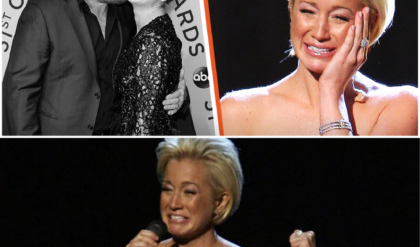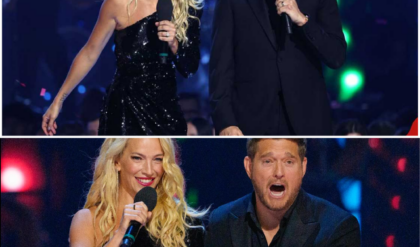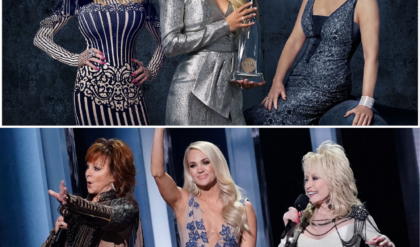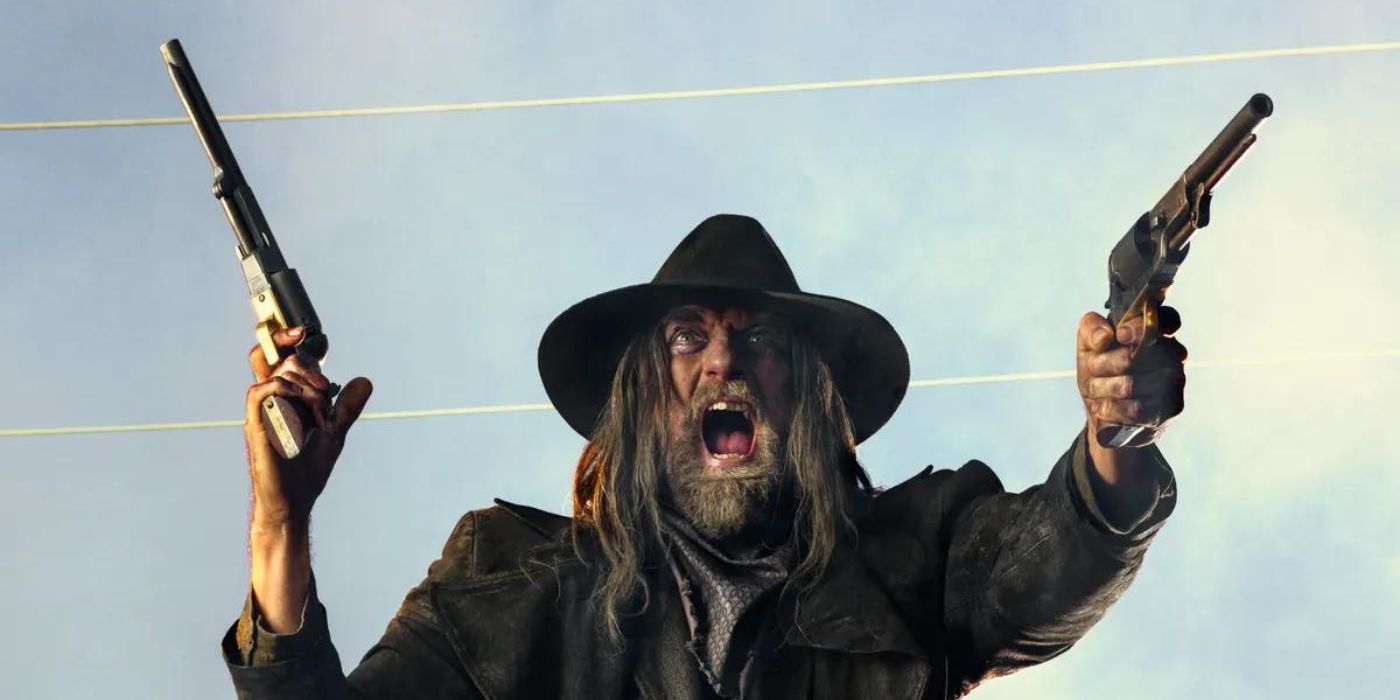
Preacher (2016) gave fans some truly novel heroes, but it also gave audiences a new kind of modern Western villain, The Saint of Killers (Graham McTavish). And while Jessie’s (Dominic Cooper), Tulip’s (Ruth Negga), and Cassidy’s (Joseph Gilgun) stories are at the heart of the show, the Saint of Killers is undoubtedly the forge that tempers their resolve. What makes the Saint so evil is his complete and utter indifference to human life. He kills both the good and not-so-good alike, his bullets never missing and his blade never dulling. He is relentless, and although most Westerns are filled with amoral killers, there are none so badass that they have killed both God (Mark Harelik) and Satan (Jason Douglas) and everything and everyone in between.
Modern Western villains typically meet terrible fates, shot dead by the hero. They never get away with their evil. Yet, the Saint of Killers is the only character in the show who emerges unscathed, finding himself sitting on the throne of God after the series concludes, where he maintains his indifference to his predecessor’s creation. He learns nothing and does not change at all. His is a flat arc that the universe will undoubtedly bend around. He is unlike any villain anywhere, but this is especially true for Westerns. Western villains are almost always human and surely killable, but this is not true with the Saint. There is no power greater than him in the entire universe. This novelty of evil makes him such an unforgettable character and a different kind of modern Western villain altogether.
Graham McTavish Is Terrifying as the Saint of Killers in ‘Preacher’
Adapting a beloved graphic novel into a TV series is a tricky thing. Long-time fans of Preacher have particular expectations concerning the characters. Yet, direct adaptations run the risk of becoming boring. The series must stand on its merits without relying on too much nostalgia to hold the audience’s attention. Preacher does an excellent job of this. Fans of Preacher will learn that the television series is more or less a direct adaptation of the original graphic novel written by Garth Ennis and Steve Dillon. However, the relationships with God and Satan veer significantly from the original story arc, providing a fun and fresh take on an old favorite.
So, just who is the Saint of Killers? Graham McTavish plays the murderous former Confederate general, named William, whose fall from grace is precipitated by the death of his wife and daughter. While retrieving medicine for his ailing family from enemies from his past, William returns home to find them being eaten by crows. His hate previously quelled by the sublime and simple life he had retreated to with his family, now gone, ignites a fire in him that burns so hot it threatens to immolate the universe. The Saint returns to the bar in Ratwater where the men who had attacked him are lounging about, enjoying their temporary victory — until he ruthlessly slaughters them. But he does not stop there; this is an important distinction about the character of The Saint. He kills everyone — the awful men indirectly responsible for his daughter’s death, deserving of their fate to be sure — but also the innocent, such as the bar-maids, the men, women, and children of Ratwater. Every single living thing becomes an outlet for his undying and unbridled rage. It is easy to think that the Saint is motivated by a sense of justice, but this would be a grievous error. He hates all life, perfectly captured in his grim attitude and imposing yet disheveled appearance. McTavish accomplishes all this more or less monosyllabically or with a primal grunt. His evil sneer and presence on the screen are formidable. He fills a frame beautifully, making everything around him look small, weak, and himself, above all, threatening. So when audiences find him languishing in Hell, reliving that fateful day where his last shred of humanity was ravaged by disease and eaten by crows, it is more or less a self-imposed exile, a forgivable departure from the graphic novel to illustrate just how tired of life The Saint is. He would rather be in Hell than play among the living. He is more than a man — an entity turned away from all life and worthy of being the big, bad Saint of Killers, a power that would prove more formidable than God, The Devil, Jessie, Tulip, and Cassidy.
What Makes the Saint of Killers a Different Kind of Western Villain?
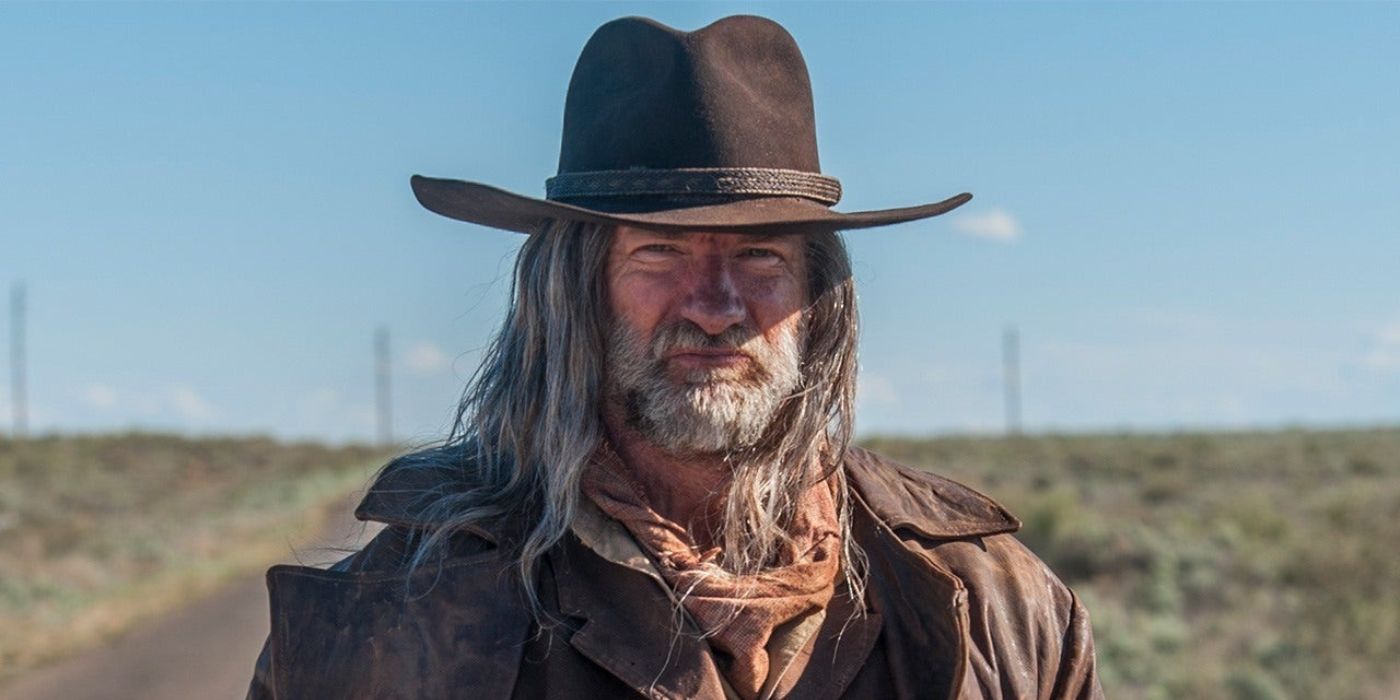
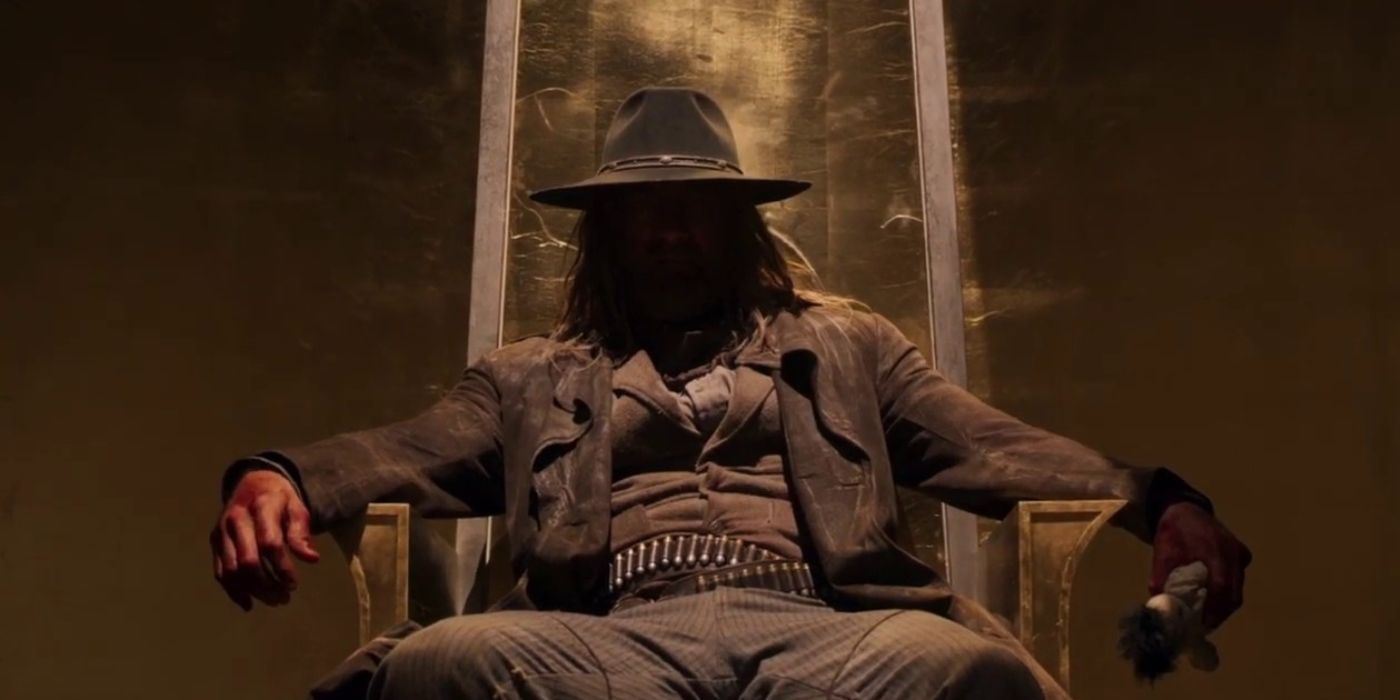
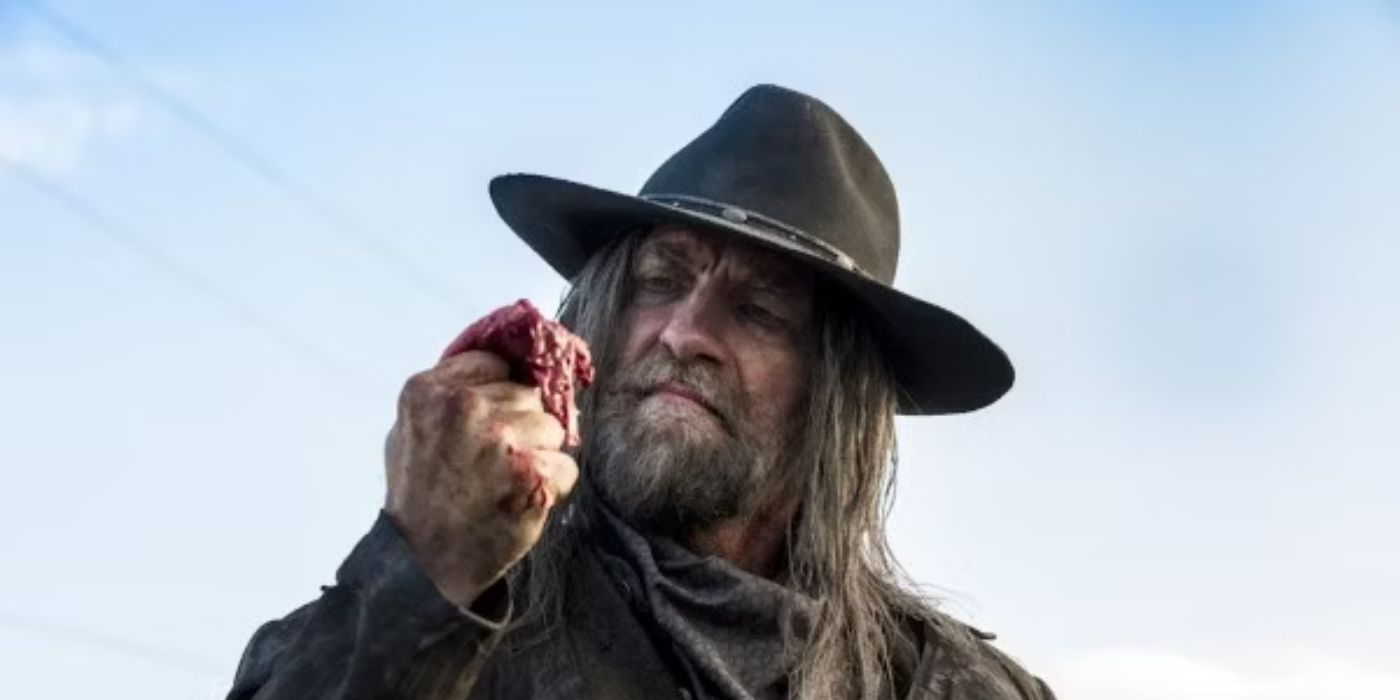
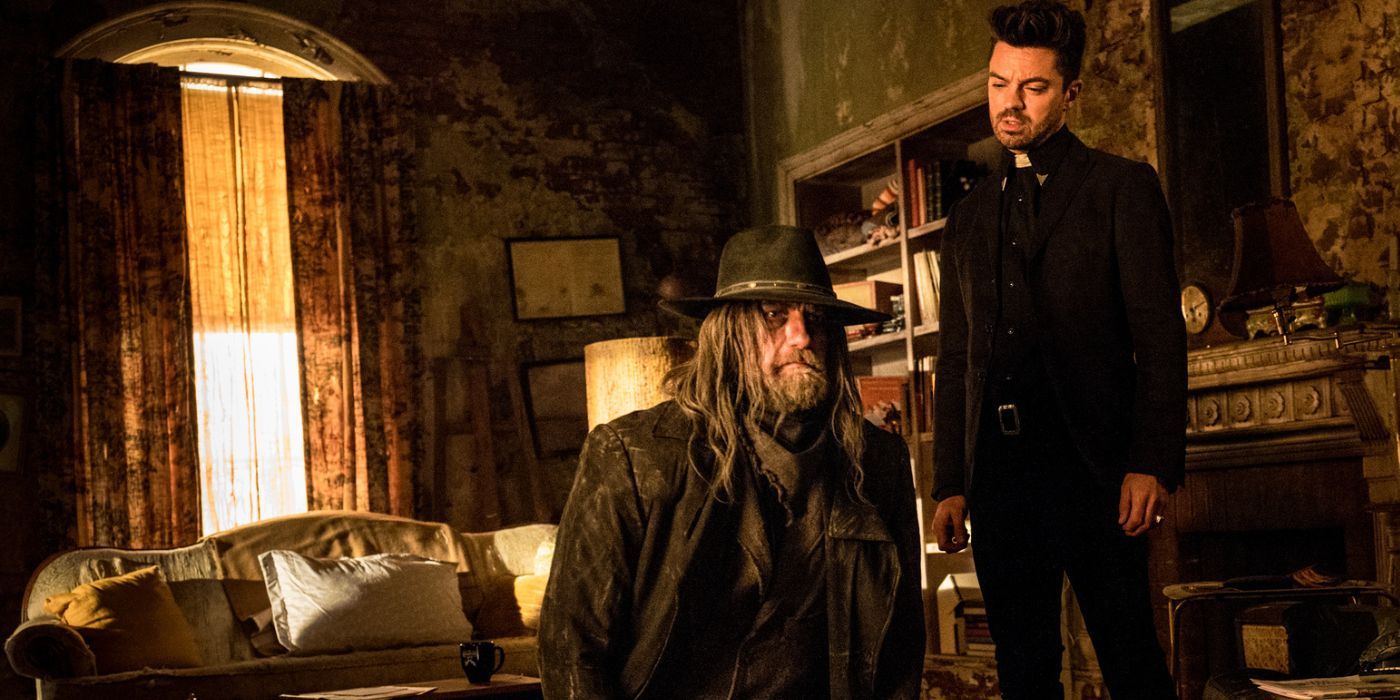
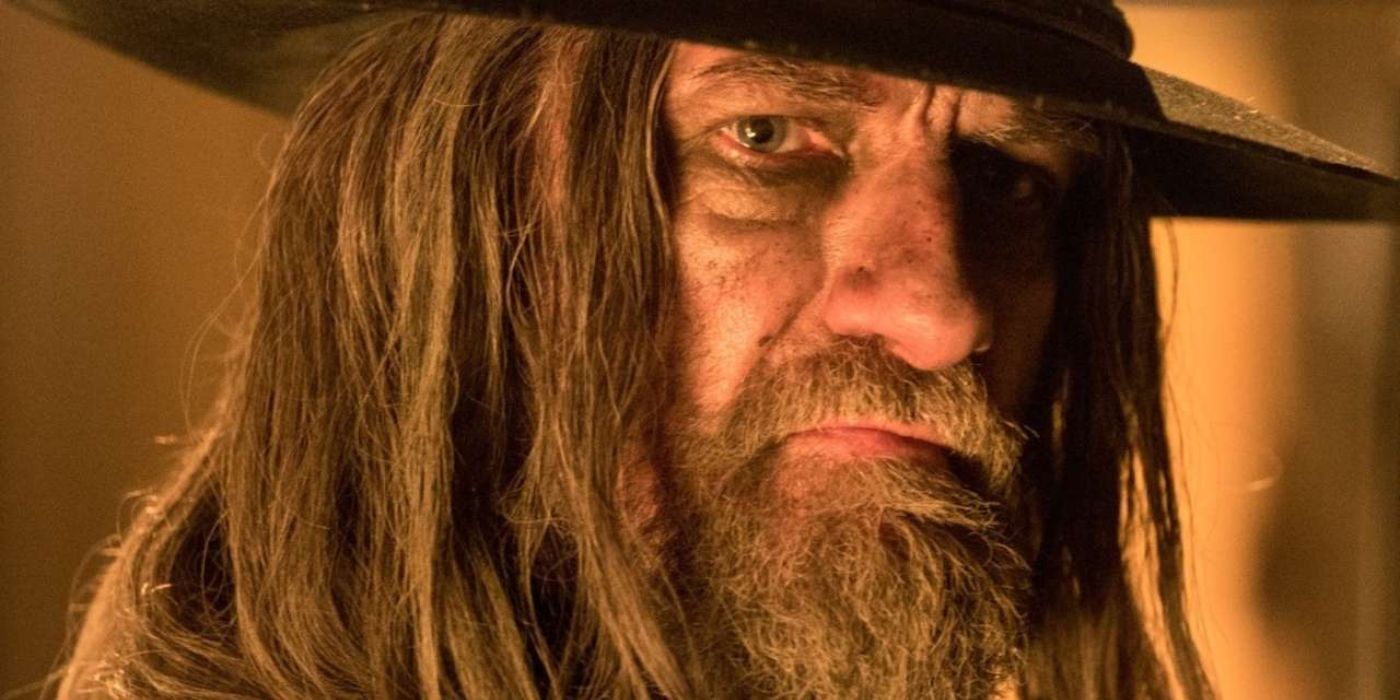





The entirety of the Western genre is replete with soulless, dead-eyed killers, but there can only be one worthy of being their Patron Saint, and Preacher delivers. When it comes to the subject of killing within the Western genre, there are two types: the justifiable and the unjustifiable. Justifiable killings are the business of the hero. He kills to restore balance to the story world. Unjustifiable killings are the realm of the villain. They murder the innocent and are ultimately punished by the hero at the end of their journey. The bad guys are not supposed to get away with their mayhem, making the Saint of Killers a new kind of Western villain. Not only does he get away with it, he becomes the most powerful being in all creation.
The Saint, at the behest of Satan, pursues Jessie, Cassidy, and Tulip across the southern United States of America on their journey to hold an absentee God to account. He cuts a blood and gore-soaked path during his pursuit and kills everyone who gets in his way or aids the motley crew on their journey. He cuts out a priest’s tongue; he murders an entire hotel full of gun enthusiasts whose near-nuclear assault on him leaves the Saint unscathed and unfathomably angry. In a tense scene between Tulip and The Saint, with his hands crushing her throat, Tulip is helpless under his power. This is significant because, before that terrifying moment, Tulip is presented as a wild card, an unflappable badass, a dead shot, and a ruthless killer in her own right. Tulip shrinks under the assault and is profoundly changed by it. As she hides out in New Orleans at Cassidy’s son Denis’ (Ronald Guttman) dilapidated home, she relives her trauma over and over. She is so damaged by the experience that she takes to getting shot in the chest for fun at a local bar. This is an essential distinction between the Saint and the show’s heroes; they do not beat the Saint of Killers; they survive him. At the culmination of the series, Jessie does not stand over the body of his dead enemy like so many Western heroes before him. Instead, at the end of the series, The Saint remains unscathed and more potent than ever. At the same time, Jessie and Tulip fade into obscurity and ultimately slip into death, with Cassidy immolating himself as he and the dynamic couple’s adult daughter mourn their passing.
What Happens to the Saint of Killers at the End of ‘Preacher’?
Jessie, Tulip, and Cassidy’s primary goal in the ‘Preacher television series is to find God and hold him accountable, and to do that, they will traverse a world full of megalomanic badmen and, more or less, kill them all. Herr Starr’s (Pip Torrens) party-at-the-end-of-the-world sees him disfigured with The Grail in ruins. Jessie’s grandmother, the spooky Marie “Gran’ma” L’Angelle (Betty Buckley), and her henchman Jody (Jeremy Childs) are dead. Finally, even God himself is shot dead by the Saint after Jessie more or less negotiates the hit. Every enemy that Jessie and company face ends up in a far worse place than where they started. Even the heroes will not emerge unscathed, broken, traumatized, and exhausted by the world. After the big finale, they slip into uneasy retirement and disappear from the show altogether. God is never really called to account, just murdered, and now, with God dead, everyone seems sort of like a loser. No real lessons are learned — a kind of jolly nihilism permeates all of them, except for The Saint of Killers.
With a bullet firmly lodged in The Godhead and the Saint never further from his humanity, he takes a reluctant place upon the throne of the Most High, the only time in the series that The Saint of Killers appears to be at rest. While he does not assume the role of God, he leaves the universe in a moral vacuum where love, death, and suffering play out, more or less, without any meaning. God is no longer present to account for these features of human life, and, as some would suspect, the universe will remain cold and indifferent for the rest of time. For the first time, humanity is no longer a piece in some cosmic chess game and the Saint is simultaneously a bringer of death and a reluctant liberator. Again, he does this out of hatred for God, not out of a sense of justice or love for humanity. The Saint of Killers just happens to be the only one strong enough to end the tyranny of God and Satan, and yet he remains indifferent mainly in life. There is no point where the Saint gains an appreciation for life. There is no point where his evil and cruel nature is facilitated by the hero’s sage words or actions. No, his hatred remains eternal, now taking his repose on a celestial throne made of gold, his guns now silent for the time being.
This makes the Saint of Killers a different kind of Western villain. Up until now, the murderous, bloodthirsty bastards that live and die on the dusty Western plains are very, very dead, and they do not become God. No villain in any Western has ever been rewarded with omnipotence and endless power for their proficiency at killing. And as far as killers go, The Saint is the greatest. As long as there are killers, there will be their patron Saint, an unending and enduring feature of the universe that is solely unique to Preacher, a treat for fans and a perfect adaptation of one of the best characters and graphic novels ever written.
Preacher is available to buy on Prime Video in the U.S.
